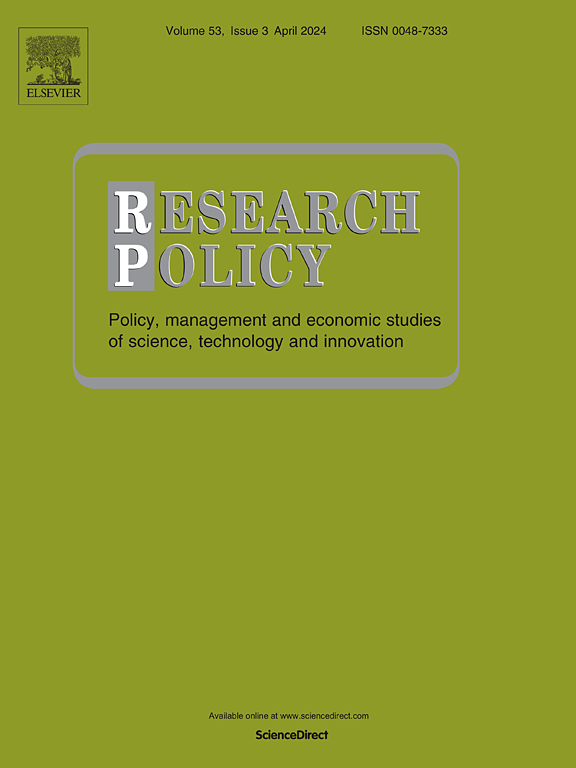加速低碳转型中的政策反馈和社会技术反馈:以照明和智能电表案例研究为例的综合概念框架
IF 8
1区 管理学
Q1 MANAGEMENT
引用次数: 0
摘要
本文旨在为政策反馈和社会技术系统方面日益增长的研究链做出两个概念性贡献,这些研究链强调政策可以在社会技术系统中产生影响,进而影响政策制定并加强政策轨迹。虽然政策反馈与理解加速低碳转型相关,但第一个贡献是建议更全面的理解还应包括社会技术系统内的反馈。因此,我们提出了一个综合的概念框架,它打开了社会技术系统的黑盒子,并以企业、用户、更广泛的公众和技术之间的社会技术反馈的更有区别的概念来补充政策反馈。这些社会技术反馈可以降低成本、提高绩效、增加信心和投资、有利的公众辩论和提高用户采用率。我们建议并表明,加速低碳转型需要积极的政策反馈和积极的社会技术反馈。第二个贡献是详细阐述了技术特征(如设计复杂性和定制需求)在积极或消极塑造反馈循环中的调节作用。我们将概念框架应用到英国节能照明和智能电表的案例研究中,实证地展示了前者的积极政策反馈和社会技术反馈如何加速了LED的过渡,并随着时间的推移导致了更强有力的政策,而后者的负面反馈导致了比预期更慢的扩散和延迟部署目标。本文章由计算机程序翻译,如有差异,请以英文原文为准。

Policy feedbacks and socio-technical feedbacks in accelerated low-carbon transitions: An integrated conceptual framework illustrated with case studies of lighting and smart meters
This paper aims to make two conceptual contributions to the growing research strand on policy feedbacks and socio-technical systems, which highlights that policies can generate effects in socio-technical systems that subsequently shape policymaking and strengthen policy trajectories. While policy feedbacks are relevant for understanding accelerated low-carbon transitions, the first contribution is to suggest that a fuller understanding should also include feedbacks within socio-technical systems. We therefore propose an integrated conceptual framework that opens up the black box of socio-technical systems and complements policy feedbacks with a more differentiated conceptualisation of socio-technical feedbacks between firms, users, wider publics, and technology. These socio-technical feedbacks can generate cost reductions, performance improvements, increasing confidence and investments, favourable public debates, and enhanced user adoption. We suggest and show that positive policy feedbacks as well as positive socio-technical feedbacks are needed to accelerate low-carbon transitions. The second contribution is to elaborate the moderating role of technological characteristics such as design complexity and customisation needs in positively or negatively shaping feedback loops. We apply our conceptual framework to case studies of energy efficiency lighting and smart meters in the UK, showing empirically how positive policy feedbacks and socio-technical feedbacks in the former accelerated the LED transition and led to stronger policies over time, whereas negative feedbacks in the latter case resulted in slower than anticipated diffusion and delayed deployment targets.
求助全文
通过发布文献求助,成功后即可免费获取论文全文。
去求助
来源期刊

Research Policy
MANAGEMENT-
CiteScore
12.80
自引率
6.90%
发文量
182
期刊介绍:
Research Policy (RP) articles explore the interaction between innovation, technology, or research, and economic, social, political, and organizational processes, both empirically and theoretically. All RP papers are expected to provide insights with implications for policy or management.
Research Policy (RP) is a multidisciplinary journal focused on analyzing, understanding, and effectively addressing the challenges posed by innovation, technology, R&D, and science. This includes activities related to knowledge creation, diffusion, acquisition, and exploitation in the form of new or improved products, processes, or services, across economic, policy, management, organizational, and environmental dimensions.
 求助内容:
求助内容: 应助结果提醒方式:
应助结果提醒方式:


